Unsure about your French table manners? Click Here to download > > How to avoid these 10 food etiquette mistakes !
- Home ›
- Ze French ›
- Holidays & Traditions ›
- Halloween in France
Halloween in France: A Modern Tradition with Ancient Roots
Updated 22 October 2024 by Leyla Alyanak — Parisian by birth, Lyonnaise by adoption, historian by passion
Halloween in France is relatively new: before the 1990s, it was unknown here. Largely seen as an American import, reactions to it are mixed but it is gaining traction among children. While it is mostly celebrated in larger cities, small villages (like mine) are getting in on the act.
Halloween in France didn’t exist for me until I moved to the tiny lakeside village of Yvoire, over the border from Switzerland.
In summer, Yvoire is a tourist magnet, with 10,000 visitors a day. In winter, a few scattered residents share the space within its medieval walls.
That’s when my brother, whose house I was sharing, came up with the idea of a treasure hunt for Halloween.
Yvoire is near both Annecy and Geneva (see just how close in this road trip), both of which are home to many foreigners. In other words, it’s a huge expat catchment area filled with people already familiar with Halloween.
And a treasure hunt suddenly materialized.
NOTE: Pages on this site may contain affiliate links, which support this site. See full Privacy Policy here.
As Halloween rolled around, my brother spent days hiding gifts and treats throughout the village. With only a few residents, it wasn’t hard to find hiding places, and the medieval streets and buildings lent themselves well to this kind of magical, secretive celebration.
The first year went so well it became a tradition, and by the third year, a local television station showed up to film these strange, mostly foreign adults and their children, wearing robes and makeup and chasing pumpkins and ghosts through cobblestoned streets.
The novelty soon wore off and today, Halloween is sneaking into the world of French tradition, although not everyone is happy about that.
Celebrating Halloween in France
By late October, the crisp air and fallen leaves signal it’s “that” time of year. Fall in France. Summer is truly over.
Halloween falls on October 31st, but there’s a better-known holiday the day after, on 1 November. This is All Saints’ Day, or La Toussaint, the day we visit cemeteries and place chrysanthemums on the graves of our loved ones.
The pagan traditions and the catholic church seem to coexist, one more solemn, the other more spooky.
The French, a bit prickly about foreign imports, often see Halloween as a strange event from America, one designed to part you from your money by making you buy bags of cheap candies and strange plastic masks made in China.
It is more of a commercial holiday, with a lot of black and orange Halloween decorations in shop windows: it’s a chance to sell people things they don’t need and turn the event into yet another buying opportunity.
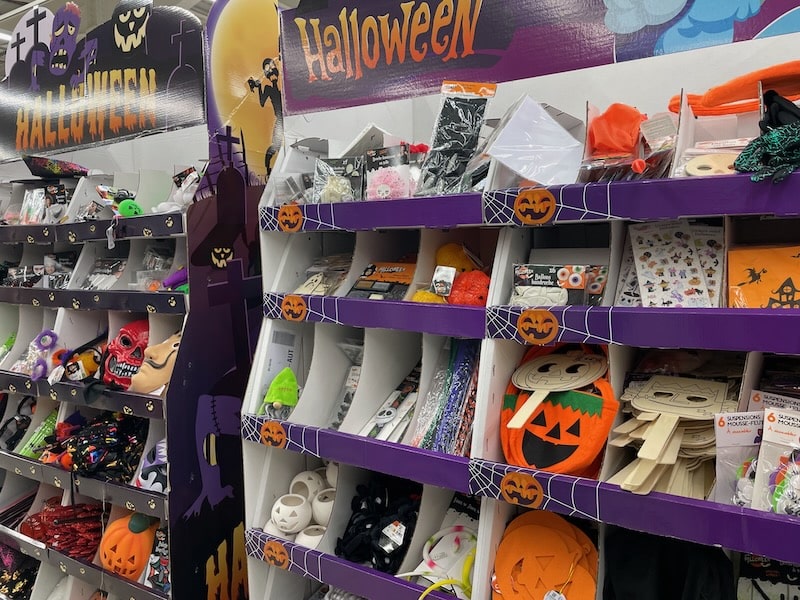 The latest offering from my own rural supermarket: pretty tatty and meant to last only a few days ©OffbeatFrance
The latest offering from my own rural supermarket: pretty tatty and meant to last only a few days ©OffbeatFrance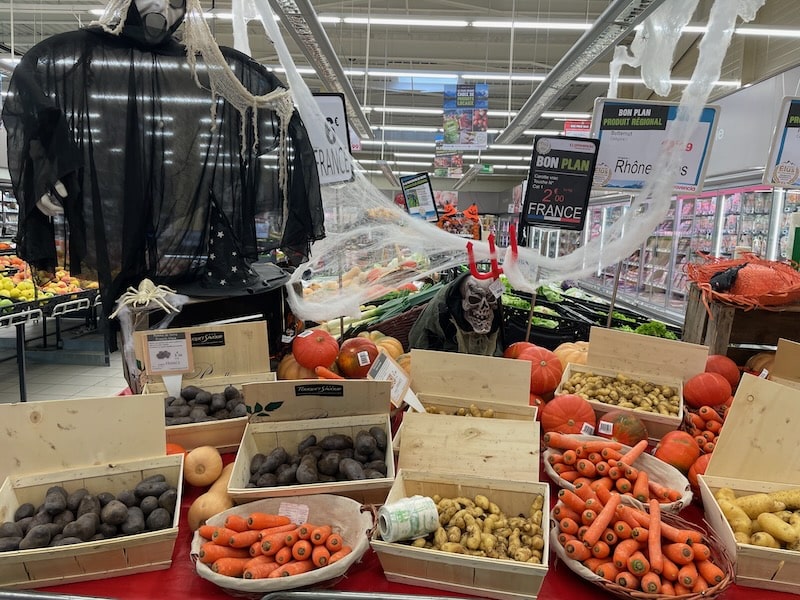 A slightly more original display, still in my supermarket - let's see what we can do with colors! ©OffbeatFrance
A slightly more original display, still in my supermarket - let's see what we can do with colors! ©OffbeatFranceWhen it comes to business, some of my friends compare Halloween here to Valentine’s Day, although the day of love gets by with more affection than Halloween. Valentine’s Day IS about love, after all…
But back to our ghosts and ghouls.
French Halloween’s urban vibe
Not surprisingly, French cities have taken to Halloween more easily than the countryside, although there are exceptions, as you’ll see in a moment.
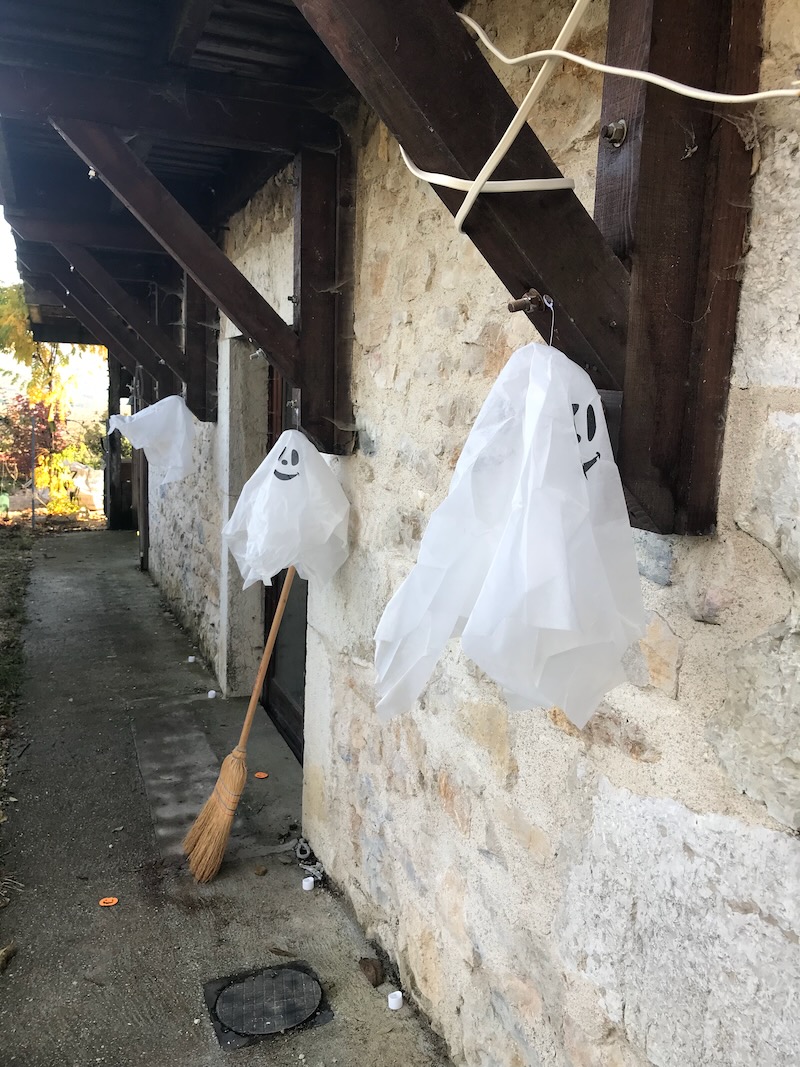 Outside my house, ready for trick-or-treaters ©OffbeatFrance
Outside my house, ready for trick-or-treaters ©OffbeatFranceCities can easily organize themed or special events revolving around haunted and ghostly topics, especially in areas where there are tourists familiar with the tradition.
Take Disneyland Paris – it might be over the top, but theme parks take their Halloween seriously. Here and there, you might find a Halloween party, and let’s face it, it’s a lot easier to trick-or-treat in an apartment building than on dark and lonely rural roads.
Not all children go trick-or-treating, and many homes don’t stock anything to give to them when they do show up. Still, the event is increasingly acknowledged.
My rural Halloween
I do celebrate Halloween, if for no reason other than giving children an opportunity to do and see something different.
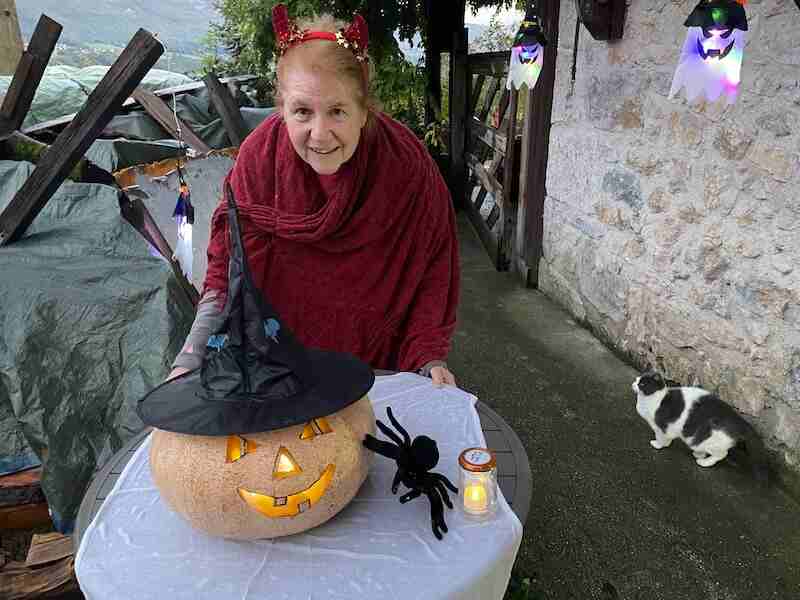
We’ve been decorating the driveway for Halloween for more than 20 years, and children keep coming.
We’re hard to miss, with witches and pumpkins and ghosts lit up by candles (these days they’re batteries, so the rain doesn’t matter), so if there are trick-or-treaters, they’re bound to stop here on their candy hunt.
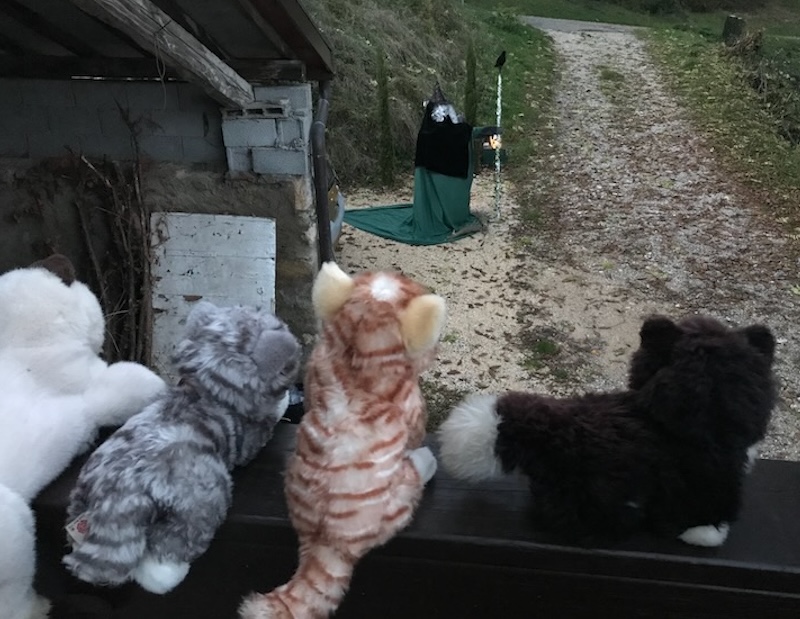
And word gets around.
“They have candies! They have chocolates!”
The streets around me are dark – I live in the countryside in a tiny village without a single shop – so there’s always an adult or older sibling accompanying them.
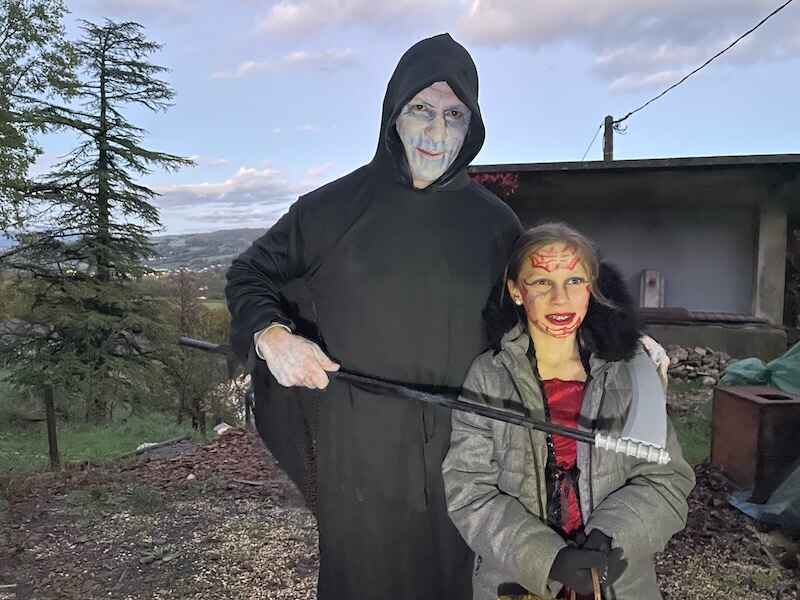
There’s little ceremony involved: on Halloween night, the adult rings the bell or knocks on the door, we open (wearing our own little Halloween costumes, of course), and the children shove their uniform plastic pumpkin baskets at us.
We’re prepared, of course, with 30 or so little treat-filled sachets, at least 20 of which will go. The remainder will be a gift to my neighbor, whose nieces and nephews don’t trick-or-treat but are happy to enjoy the leftovers.
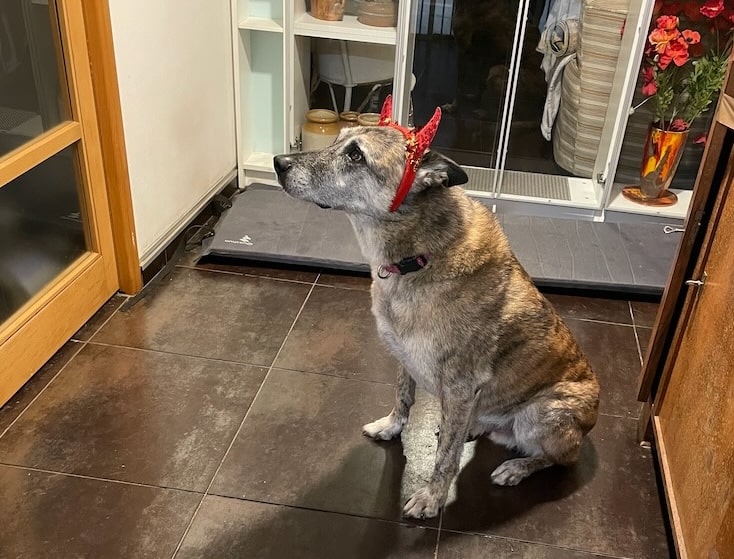 Our dear senior citizen, Merlin, always ready to join a party
Our dear senior citizen, Merlin, always ready to join a partyWhat do we give?
Just what you might expect: chewy candies (individually wrapped), mini chocolate bars, other wrapped sweets, a 2 Euro coin… the usual, I think.
I also suspect children from neighboring villages show up here, knowing they’ll hit “pay dirt”, and that their own villages may not be quite so Halloween-sensitive.
As for the rest of my village, there must be someone handing out candies because by the time they get to my house (the village’s first or last, depending on your direction) their baskets are often half full.
Only in France
While Halloween may slowly be making inroads in France, it’s not really part of French culture, and Halloween celebrations are not quite the same here as in many English-speaking countries.
For example, the children’s costumes are relatively somber: ghosts, ghouls, skeletons – things related to death. Few carnival costumes here.
Also, they’re mostly store-bought, although you will occasionally spot some originality, such as a sheet with two holes cut out for the eyes, or a bit of clown makeup.
A few regions in France do celebrate Halloween with a twist, like the Lorraine, where root vegetables are carved instead of pumpkins.
In fact, there’s even a Grimacing Beet Festival, held at the end of October each year (but I think they mean rutabagas, not sugar beets).
If there’s a corner of France where a stronger Halloween tradition would make sense, you’d be looking at the northern half of the country.
It is believed that the celebration of Halloween evolved from ancient traditions, with the end of the harvest marked by the ancient Celtic festival of Samhain, a rapprochement of sorts between life and death.
Given the Celtic background of parts of the region, we can understand a certain predisposition to Halloween. But on the whole, France prefers to celebrate the church’s November 1st instead.
All in all, despite a peak of interest among French people at the turn of the millennium, in recent years Halloween hasn’t grown massively here. It doesn’t help that it’s smack in the middle of the Toussaint mid-season school break, which means some children may be away on vacation with their families. On the other hand, since 1 November is an official holiday, no one has to get up early so nothing stands in the way of taking children out for a Halloween evening of trick-or-treating.
We may have adapted to Halloween, but I don’t believe we’ve quite adopted it yet. Maybe next time.
Perhaps it will turn into a generational thing with people of all ages taking part: children and teenagers will don costumes and head out to trick-or-treat, while their older relatives will wait until the next morning, La Toussaint, and take their flowers to the cemetery.
Before you go…
Halloween may be a modest event here, but it could grow, especially in major cities. French folks, after all, don’t shy away from ghost stories and beliefs in the supernatural.
And if you're in Paris around Halloween and looking for something spooky to do, you could visit the Catacombs (which are on this list of 9 haunted Paris places), or any one of these dark tourism sites.
Like children everywhere, French children are keen on spooky decorations, little lanterns, and a bit of hocus pocus. And maybe some pumpkin carving…
In case you’re curious about La Toussaint and other French holidays, make sure you check out my story on French holidays and traditions.
And meantime, Happy Halloween!

